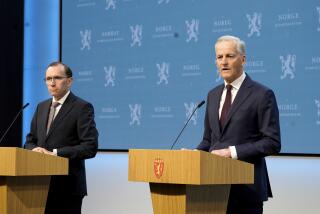Europe less than unanimous in support of a free Kosovo
- Share via
MADRID — With the province of Kosovo expected to declare independence from Serbia this weekend, it is increasingly unlikely that Europe will offer a united pledge of support, officials and diplomats across the region say.
There is unease in several countries over the precedent Kosovo’s secession would set and over the ability of the corruption-plagued government in the ethnic Albanian province to rule.
The United States, the most fervent promoter of Kosovo’s independence, has counted on backing from the European Union as a way to present a picture of broad support for the move. But several countries, especially those with their own restive ethnic minorities, have raised objections and indicated that they will not recognize a new Kosovo state, at least not immediately.
“Spain does not favor any unilateral declaration of independence,” Spanish First Deputy Prime Minister Maria Teresa Fernandez de la Vega said Friday.
“For the government of Spain, the fundamental priority is a solution that respects international law and that guarantees regional stability.”
Spain is confronted with numerous separatist movements, some violent, inside its borders. Basque nationalists who want their own country carved from part of northern Spain and southern France praised Kosovo, saying its anticipated declaration of independence showed “we are not talking about utopias.” And an official from a pro-independence group in Catalonia, the region that includes Barcelona, said of Kosovo on Friday: “We are celebrating.”
With similar worries regarding minority groups, Greece, Romania, Cyprus, Belgium, Bulgaria and Slovakia, from within the 27-member European Union, joined Spain in expressing reservations over Kosovo’s secession.
“Raise your hand if you don’t have a separatist in your house,” Italy’s leading daily, Corriere della Sera, wrote. “The domino effect is terrifying many central governments.”
Despite the divergence of opinion, EU officials, meeting in Brussels on Friday, were nearing agreement on the formation and deployment of a 1,800-member police and judicial team for Kosovo. The team will replace the United Nations mission that has administered the province since North Atlantic Treaty Organization bombing drove out Serbian forces in 1999.
The EU effort will mark the formal end of the U.N.’s role. Russia, which, with Serbia, adamantly opposes the independence of Kosovo, has said it will regard the EU presence as illegal.
Dimitrij Rupel, the foreign minister of Slovenia, whose country holds the rotating EU presidency, said he was confident an agreement would be reached and that the EU would be in Kosovo.
“Of course, there have been doubts or negative feelings in some countries,” Rupel told a Polish newspaper. “But there are not that many after all. . . . When the moment comes, I think the EU will speak with one voice.”
On Friday, the prime minister of Kosovo, Hashim Thaci, went before a packed news conference in the capital, Pristina, and refused to confirm that his administration would declare independence Sunday, as is widely expected. Instead, he attempted to address concerns of the international community and promised that members of non-Albanian minorities who live in Kosovo, including about 100,000 Serbs, will be safe and their rights respected.
In Belgrade, the Serbian capital, where President Boris Tadic was being inaugurated after winning reelection Feb. 3, officials were beating drums of nationalist rhetoric about Serbia’s refusal to let Kosovo go, and the reprisals that might be faced by capitals that recognize the new state.
“Throughout the centuries, many bullies have tried to forcibly wrench Kosovo from us,” Prime Minister Vojislav Kostunica said, “but for the first time in our history, they demand we accept the grabbing of Kosovo, like slaves.”
Serbs regard Kosovo as their medieval cultural heartland and its loss as an amputation of 15% of its national territory in violation of international law. The U.S. and those European countries that support its independence, including Britain and France, point to the killing and deportation campaigns waged in Kosovo by the late dictator Slobodan Milosevic to say that Serbia forfeited the right to have Kosovo under its domain.
Serbia is counting on Moscow’s support. Russian President Vladimir V. Putin, meeting with journalists this week, accused Europe of being “two-faced” because many countries were willing to allow Kosovo to secede, but many opposed such a move by the Basques in Spain. An irate Madrid government on Friday summoned the Russian ambassador to Spain to explain the comments.
Several European countries rely on access to Russia’s vast gas and oil supplies and do not want to offend Moscow.
In addition, European leaders are disenchanted by Kosovo’s failure, in the last nine years, to build state institutions, to create a viable economy and to rein in flourishing criminal enterprises.
Most of Kosovo’s leaders are former guerrilla fighters with little experience in governing; more than two-thirds of the work force is unemployed; and people are mired in poverty, despite contributions from Europe of many billions of dollars.
“This is a no-win situation for Europe,” said Vedran Dzihic, of the Vienna-based Center for European Integration Strategies. “The EU will essentially become the new protector, replacing the U.N., and confronted with all the problems, the bleak economic situation, the frustration, the lack of perspectives.”
Europe’s failure to forge a unified position on Kosovo, Dzihic said, weakens its aspirations to be a world player.
--
--
Special correspondents Zoran Cirjakovic in Belgrade and Behar Zogiani in Pristina contributed to this report.
More to Read
Sign up for Essential California
The most important California stories and recommendations in your inbox every morning.
You may occasionally receive promotional content from the Los Angeles Times.













